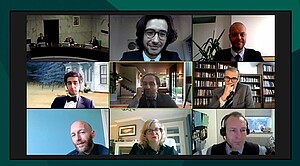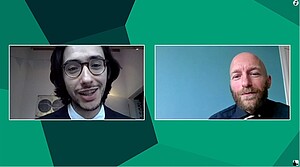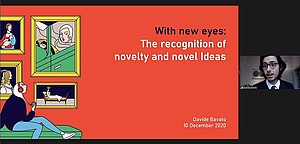PhD Defence Davide Bavato

In his dissertation 'With New Eyes: The Recognition of Novelty and Novel Ideas’, Davide Bavato explored the factors and forces regulating how people respond to novel and creative manifestations, and in particular what guides their recognition of novelty and novel ideas. Davide Bavato defended his dissertation online on Thursday, 10 December 2020 at 11:30h. His supervisors were Prof. Daan Stam (RSM) and Dr Stefano Tasselli (RSM). Other members of the Doctoral Committee were Prof. Lars Frederiksen (Aarhus University) and Prof. Charalampos Mainemelis (ALBA Graduate Business School).
About Davide Bavato

Davide Bavato is an academic researcher and lecturer in creativity, innovation and entrepreneurship. He joined the Erasmus Center for Innovation and the Erasmus Research Institute of Management (ERIM) in 2015, and the Chair for Entrepreneurship and Technology Commercialization at the Swiss Federal Institute of Technology in Lausanne (EPFL) in 2020. He has international experience in teaching graduate and undergraduate courses, and supervising master thesis research projects. Before starting his PhD, he was involved in business development projects with several European startups.
In his doctoral studies and dissertation, he investigated how people respond to new ideas and opportunities. The studies employed both inductive and deductive approaches, and examined a diversity of empirical contexts - including crowdfunding campaigns, crowdsourcing contests, pitch competitions, and startup accelerators. His work was presented in several international conferences, including the Academy of Management Annual Meeting (AOM), the European Group for Organizational Studies Colloquium (EGOS) and specialized conferences on the topic of creativity and entrepreneurship. The second chapter of his dissertation was published in the Journal of Management.
Thesis Abstract

Whereas novel ideas introduce an opportunity for innovation, it is the human experience of novelty that permits innovation to thrive or that warrants its demise. This dissertation explores the factors and forces regulating how people respond to novel and creative manifestations, and in particular what guides their recognition of novelty and novel ideas. It is argued that recognition of novelty should be understood for both its perceptual and performative nature – people’s ability to evaluate the substantive novelty of an idea, but also the role these evaluations have in establishing when novelty is valued as such. It is offered a multidisciplinary review of empirical findings and theoretical intuitions on why people differ in their responses to creativity and novelty. From the review, an intuitive framework surfaces, highlighting the interplay between the characteristics of the idea, its creator, audience, and context in determining how novelty is received. It is finally proposed that differences in evaluations predict the fate of new ideas in the competition for recognition – stronger levels of disagreement should mask the value of new ideas and put them at a higher risk of being overlooked unless said disagreement arises from a genuine plurality of interests: in this situation, controversy is a marker of an idea’s ability to attract attention, stimulate debate, and earn recognition. The validity of these propositions is tested on 26’480 ideas competing over 156 design and innovation tournaments. This work holds implications for individuals and organizations in the pursuit of novelty, showing how innovation needs people generating new ideas, and people looking with new eyes.


